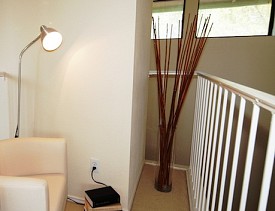Finding the Best Furniture for Home Staging
 “You only have one chance to make a first impression” is a phrase we hear a lot. Usually it refers to our personal appearance or a business or retail brand. But, it’s also very true in real estate. When we’re house hunting, we’re seeing lots of properties both online and in person. In some cases, we might be looking at as many as fifty properties online or 5 to 10 properties in person in a single day. Needless to say, things start to all look the same and we distill what we’ve seen down to their barest essentials: spacious and roomy, bright and light, clean, or small and cramped, dark and dreary, dingy.
“You only have one chance to make a first impression” is a phrase we hear a lot. Usually it refers to our personal appearance or a business or retail brand. But, it’s also very true in real estate. When we’re house hunting, we’re seeing lots of properties both online and in person. In some cases, we might be looking at as many as fifty properties online or 5 to 10 properties in person in a single day. Needless to say, things start to all look the same and we distill what we’ve seen down to their barest essentials: spacious and roomy, bright and light, clean, or small and cramped, dark and dreary, dingy.
If you’re selling an empty home or are looking to stage your house using your existing pieces, here are some furniture suggestions to get you started:
1) Mirrors: Mirrors add light and depth to nearly any space. While you do want to avoid the 80’s-era mirrored closet doors and bedroom walls, the judicious use of a decorative mirror will produce great results. A wall mirror at the end of a hallway or multiple mirrors in a bathroom reflect light in traditionally under-lit spaces and visual “push out” the walls creating a feeling of spaciousness.
2) Edit, edit, edit: As Coco Chanel famously said, “Before leaving the house, a lady should stop, look in the mirror, and remove one piece of jewelry.” This is true when presenting your home to a buying public. Open up your rooms by removing all unnecessary furniture and nearly all decorative accessories and then keep editing further. Rooms always feel larger with expanses of open floor and walls. Large overstuffed furniture with big arms and deep seats may be comfortable, but potential buyers are not looking for comfort in your furniture. Oversized pieces take up too much room and diminish a space.
3) Bonus Rooms: Create additional rooms by furnishing outdoor spaces such as covered porches, back decks or patios with small outdoor furniture such as a table and chairs for lunching al fresco, or a pair of small lounging chairs. Size is key: keep it small and simple.
4) Make sense of awkward spaces: If you have an awkward space such as a too small entryway, or the end of a back hall, create a sense of place by creating a purpose even for these small spaces. A small entry can become a tiny mudroom with a bench seat and some hooks for jackets, or perhaps you could create a cute gardening “shed” with an old bureau, some flowers and garden baskets. The back hall could become a private reading nook with a comfy chair, a footstool and a good reading light. Add a small side table for your tea and reading glasses. Just be careful not to block a point of egress.
5) Rooms need definition: If you have a spare bedroom or den that has been more of a dumping ground than an actual usable room, clean it up and turn it into a guest room or craft space. Potential buyers want to feel that they are getting the most bang for their buck and these defined spaces are very important to achieving that. Setting up a basic bedroom (even an air mattress set inside a bed frame will suffice) and covering it with simple, clean and ironed bedding will make a world of difference (there is no need to hire a remodeling contractor -- just clear your clutter and arrange some furniture).
6) Storage Ottomans: Replace oversize coffee tables with a simple and tailored storage ottoman, topped with a tray for safe placement of glasses or coffee cups. The storage space will come in very handy and these comfortable pieces can double as extra seating as well as surface space. Would you like to learn how to make a DIY storage ottoman? I knew it. You can learn how to make a tufted storage ottoman on Hometalk.com, where a member posted details and photos.
Looking for a Pro? Call us (866) 441-6648

Average Costs
Related Experiences

New Stairs And Roof Installation Are The Perfect Deck Upgrade

Seamless Extension Of Concrete Patio And Poolside Retaining Wall



